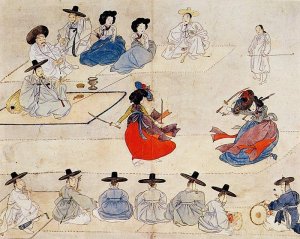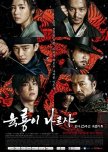
On a technical level, the screenwriters’ ability to juggle so many through lines is stunning. Set-ups in early episodes lead to powerful payoffs hours down the line, and little time is wasted, with each scene deepening characterizations, drawing parallels, establishing new conflicts and reinforcing themes. Fictional elements are well integrated with the actual history, and while liberties are certainly taken, this is a much less romanticized world than that of most fusion sageuks. Reality constantly intrudes in all its messy brutality, and show embraces this, refusing to whitewash the actions of its characters. For me, the only misstep was the writers’ attempt to create a grand, overarching mythology running from Queen Seondeok to King Sejong. It felt forced and unnecessary, an in-joke that distracted from the story at hand, and its corresponding secret society was the least convincing aspect of the show.
The directing is initially a bit awkward, but as things progress, the editing calms down and the fabulous ensemble cast takes center stage, riveting in all their flawed, passionate, terrible humanity. Dark but never cynical, violent but never gratuitous, grim but never hopeless, the show cares for all its characters, and it makes you care deeply too. They often lose their battles, but they fight with everything they have, refusing to stop seeking, striving, dreaming. They can’t go on, and yet they do. And because of them, Six Flying Dragons soars.
Was this review helpful to you?
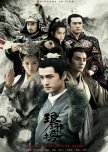
The swift pacing does present some issues though. I know that adapting a well-loved, lengthy novel to the screen is challenging, but either pruning some of the more esoteric subplots or giving them additional screen time would have made the story easier to follow. It took a good 20 episodes to figure out the major character relationships, and some elements remained hazy up until the end. While I generally don’t advocate for extended flashbacks or childhood sequences, this is one case where showing rather than telling about past events would have been helpful. While I could intellectually understand the characters’ grief and their desire to right past wrongs, it was hard to emotionally engage with people and situations only encountered in the briefest of flashbacks. Like Mei Chang-su, the show is precise, intelligent and lovely. It’s also a bit cold. I would have liked more fire in the midst of all the snow.
Was this review helpful to you?
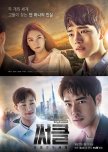
Was this review helpful to you?

What starts as an engaging meditation on how artistic works can take on a life of their own devolves into a jumble of incomprehensible rules and mangled timelines. The bigger thematic ideas get lost as you sense the actual writer struggling every bit as much as her cartoonist antihero to give her work an ending. And unfortunately, just like him, she can’t seal the deal. In a world where everyone can magically draw (or write) themselves out of difficulty, the act of creation gets reduced to expediency, not art. The fans within the show know something’s gone awry, but, alas, the fans in the “real”, real world are left hanging too. As a metaphor for how stories slip away from their authors, this one turns out to be a bit too apt.
Was this review helpful to you?
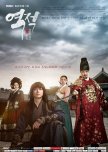
The plot mechanics, on the other hand, are less effective. There are tons of intriguing set-ups that never pay off in meaningful ways, and the story takes an awfully long time to build to anything approaching actual rebellion. It also introduces a supernatural element that’s too literal to be read as symbolic but too underdeveloped to serve as a unifying mythology. It ends up feeling like a distraction from the very real issues that the characters confront – an easy way to get the characters out of trouble (hey look, super powers!) without serving any broader thematic purpose. In the end, the show is solid, but I wish its dramatic revelations were as engaging as its revolutionary ideas.
Was this review helpful to you?

Thematically, there are some interesting ideas thrown around about slavery, class, progress and authority but the writer seems unsure of exactly what he wants to say about them. The show is built around the awfulness of slavery, but it also depicts most of its slave characters as gullible fools, reinforcing the negative stereotypes stamped on them by the powerful. Folks respond to injustice with violence and/or flight, but neither tactic really seems to get anyone anywhere. There is a lot of stunning footage of running and fighting, but little clear sense of how the audience should feel about these choices. Are we supposed to applaud them? Reject them? Realize that the situation is a hopeless mess? And what is a viewer supposed to conclude from the fact that when change does happen, it results from factors almost totally removed from the actions of the central characters?
Good acting and striking visuals keep Chuno entertaining, but the narrative muddle weighs it down. There are some powerful moments, but the script never matches the dangerous, high-flying verve of its knife-wielding leading man.
Was this review helpful to you?
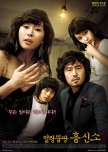
Off-kilter visuals, clever dialogue and ingenious music choices provide plenty of humor (don't miss the little bonus scenes tacked on at the end of each episode), but they’re in the service of serious themes. Without ever becoming overly didactic, the show notes the fragility of life and the importance of embracing the here and now. The protagonists may long for extraordinary riches (in this case, tons of hidden gold), but their everyday interactions are where true value lies. For the viewer, though, the biggest prize is getting to savor this underrated gem of a show. Like all treasures, it may be hard to find, but you’ll be well rewarded if you seek it out.
Was this review helpful to you?
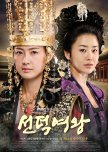
From a production standpoint, the show is often uneven. This is very much a writers’ show, and at its best, it’s tightly plotted, with thematic depth, complex characters, and powerful payoffs. It’s not perfect - the initial episodes are exposition heavy and awkward, the action lags in places, and the set-up presents a giant structural challenge that the writers are never able to fully overcome. The directing is functional, but not particularly distinguished. It’s also a show that is far more fortunate in the casting of its antagonists than of its protagonists. On the plus side, Go Hyun Jung and Kim Nam Gil are fabulous, and their performances alone are worth the 62 hour investment in the show. On the down side, this skews the dramatic structure and emotional impact of the story in ways that become particularly problematic towards the end.
Issues aside though, this remains a powerful show, one that for all the political games, epic battles, and over-dramatic close-ups keeps returning to three abandoned children and the cost of breaking human bonds. And how often do dramas of any type provide both a strong, smart female protagonist and a strong,smart female antagonist (and surround them with gorgeous guys)?
Was this review helpful to you?
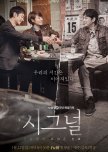
On the plus side, the show's fast pacing tends to paper over the plot holes, but it shortchanges the development of most of the secondary characters. They become “innocent victims” or “evil elites” we’re supposed to mourn or hate simply because of the suffering they endure or inflict on others. Occasionally there are glimpses of greater depth before the show bustles viewers off to the next crime scene, but I would have appreciated fewer set ups and more follow through. The concept is intriguing, but once you unwrap the layers of snazzy time warp packaging you’re left with a pretty ordinary procedural. The present may be able to change the past and vice versa, but the conventions of the crime drama survive unscathed.
Was this review helpful to you?

On the downside, I do wish the antagonists in the show were as multi-dimensional as the protagonists. The shadowy gang of leering oligarchs plotting EEEEVIL in back rooms felt preordered from central casting, with master plans that were too over-the-top to be really believable. I kept expecting them to start stroking Persian cats or feeding their piranhas. If you’re watching for the action thriller/romance elements, you probably won’t mind, but their cartoonish-ness undermines the credibility of the crusading journalists out to take down corruption strand of the story. It doesn’t diminish the fun, but it does make the show less socially relevant than it would like to be. There is also an odd casualness in the way that all of the characters, both good and bad, roam in and out of each others' lives and lairs with impunity. I guess courage is virtue, but I’m not sure I’d curl up and take a nap in the heart of enemy territory.
This is a show though where the emotional through-lines not the plot mechanics are the real draw, and those deliver with a vengeance. You’ll laugh and cry and smile and fall in love. In an entertainment world full of lots of explosions but few real sparks, that's reason to rejoice.
Was this review helpful to you?
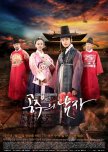
Alas, for all the lovely visuals and promising set-ups, the screenplay soon runs into issues. Few things frustrate me more than when characters act in ways that are convenient for the writer but fly in the face of common sense. Once the bloodshed begins, the characters appear to lose brain cells along with hemoglobin, making stupid choices that often seem directly at odds with their stated goals. If you’re looking for carefully crafted revenge schemes, you’ve come to the wrong show. Complex characters and decisions get dumbed down, and “Daddy doesn’t like my boyfriend” is treated as a crisis equivalent to “Dozens of innocent people may die today.” I personally found the secondary couple’s story arc much more compelling, if less swooningly romantic, than that of the leads, in large part because it seemed more grounded in the real world.
Finally, I wish the show had been willing to tackle the difficult questions raised by the historical events it draws on. This is a drama that has no place for the inconvenient truth that Suyang, for all his ruthlessness, turned out to be an excellent ruler, or for the idea that the welfare of a nation might matter more than the suffering of the elites. The period offers fertile ground for exploring if and when ends justify means, but the writer ultimately settles for easy heroes and villains. All in all, there’s a lot of flair, but far less substance than I hoped for.
Was this review helpful to you?
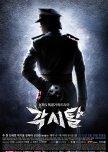
Always. It’s like being trapped in a room with a blind boxer. Windows get broken, messes get made, lots of punches go awry. Between the shouting and the pistol-waving and the torture and the explosions you may want to slip the show a few Valiums and tell it to chill. But then a punch lands, and damn . . .
Is the show often over-the-top? Repetitive? Uneven? Infuriating? Yes. All of the above. But its no-holds-barred approach is also its greatest strength. The show takes big risks, and while not all of them pay off, its willingness to push the boundaries of content and plot conventions makes it gripping and unpredictable. It’s rarely subtle, but when it works it’s powerful. Much of this power comes from the raw energy of its male leads, and their explosive chemistry as they love and hate and destroy each other and those around them. The female lead is weak but it doesn’t really matter. This show is all about the boys.
Is there a lot of sturm und drang? Yes. Is all of it necessary? Maybe not, but the best moments will haunt you long after the screaming stops.
Was this review helpful to you?
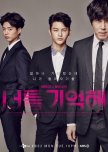
Was this review helpful to you?
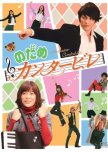
The manga-esque staginess takes a bit of getting used to, with heavy-handed (literally) physical attacks and cartoonish mugging. The silliness alternates between endearing and alarming, but there is nothing frivolous about the show’s treatment of music. It notes how unforgiving the arts world can be, full of too many gifted students and too few opportunities, how competition, envy, harsh instructors and grueling practice regimens can drain the spark from performers. But, to its credit, the drama never glosses over the discipline needed to do great work. This is a show that celebrates both playfulness and rigor, suggesting that the best art comes not from one or the other but from a happy marriage of the two. It isn’t the misfits vs. the superstars, but an understanding that both are needed to bring a score to life. Moments of true harmony may be fleeting, but when they happen, in either love or music, it’s cause for celebration.
Was this review helpful to you?
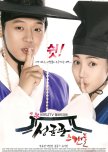
Unfortunately though, while the show is willing to raise provocative issues, it’s unwilling to really deal with the ramifications of those issues. A world where being an educated woman or a gay man is a capital crime is hardly likely to provide a happy ending for nonconformists. Instead of confronting this head-on, the drama drifts into fantasy in its final episodes, substituting feel-good platitudes and miraculous solutions for the difficult problems it has so compellingly presented. This allows it to maintain its romantic comedy credentials, but at the cost of what could have been a much darker, but also much more honest show.
Was this review helpful to you?

